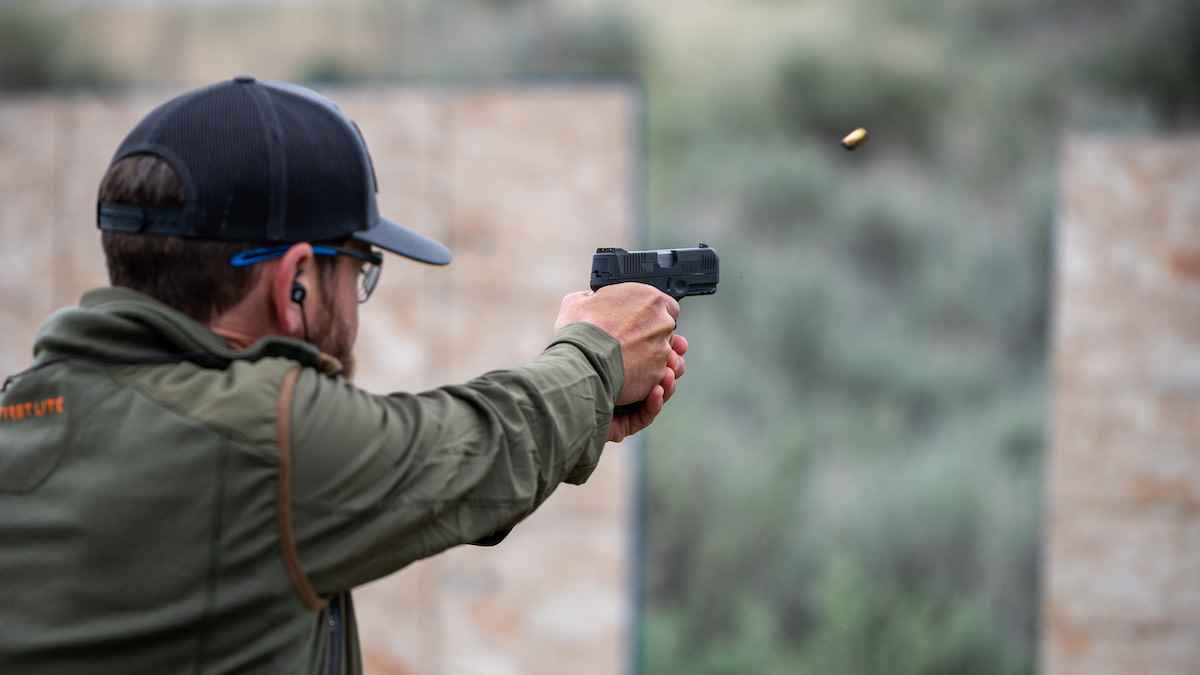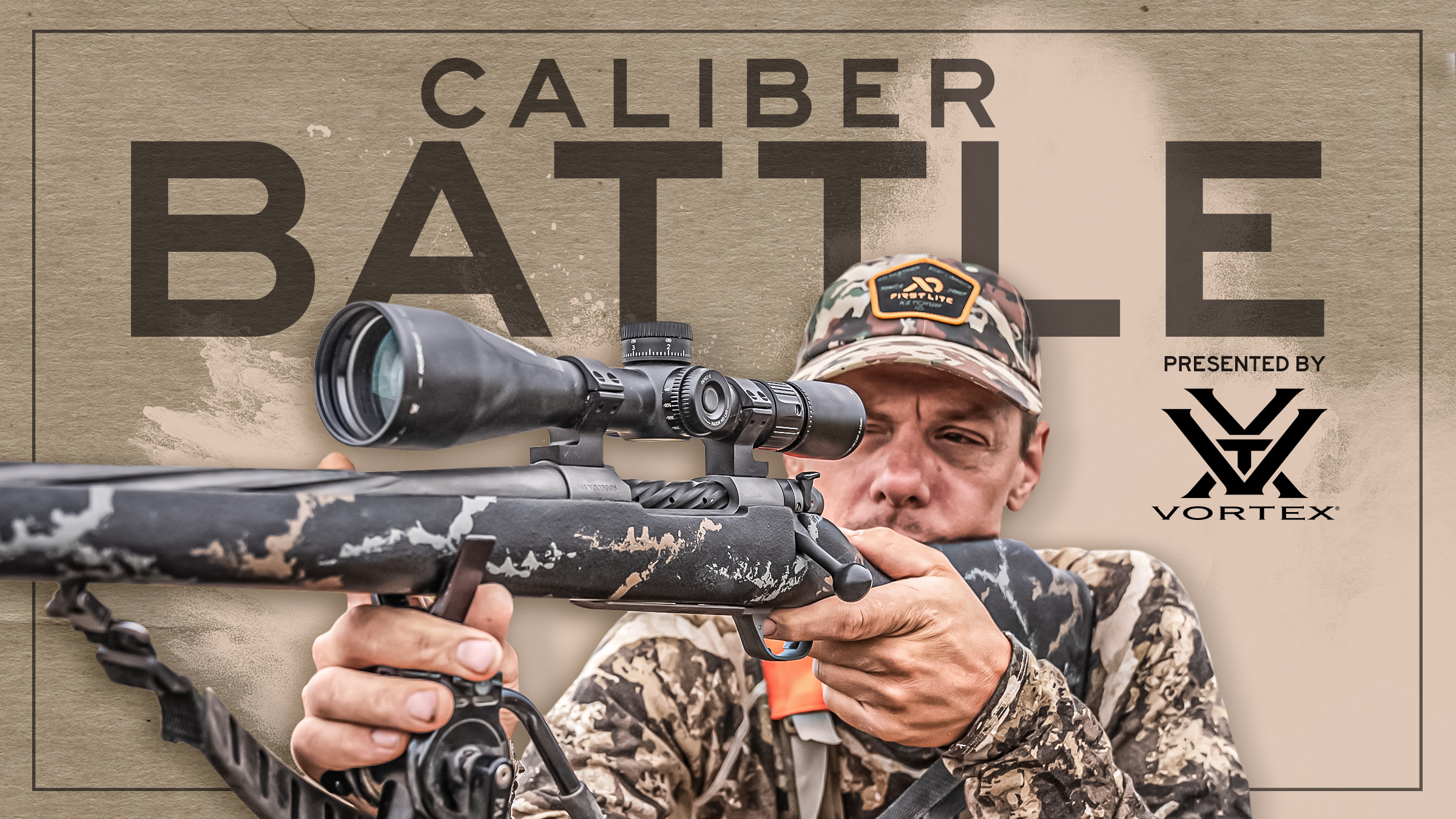
This is a Caliber Battle for the ages. American gun enthusiasts have been debating the comparative merits of the 9mm Luger and the .45 ACP since the first U.S.-made 9mm handguns hit the market in the 1950s. While someclaimthe debate is over, the continued popularity of “9mm vs. .45 ACP”articlesandvideossuggests that everyday gun owners haven’t made up their minds.
We won’t settle that debate today. As with most things gun-related, the honest answer is, “It depends.” However, we thought the Caliber Battle gauntlet could still offer new insight into the ultimate old-school vs. new-school controversy.

Ballistics
Defenders of the 9mm will often point out that today’s cartridges offer greater ballistic capabilities than those available to previous generations. Advances in powder, bullet construction, and handgun construction allow modern 9mm firearms to fire bullets faster, and those bullets tend to be more ballistically effective than their older counterparts.
However, the .45 ACP has also benefited from those same advances. Federal, for example, offers +P versions of their solid core predator defense line in both cartridges (+P designates ammunition loaded to produce higher pressures. Usually, this translates to greater velocity at the muzzle).
The9mm versionfires a 147-grain bullet 1,120 feet-per-second (fps) and produces 409 foot-pounds (ft.-lbs.) of energy at the muzzle. The.45 ACP version, on the other hand, launches a 240-grain projectile 1000 fps and produces 533 ft.-lbs. of energy at the muzzle, giving it 30% more power than the 9mm.
These are Federal’s hottest offerings in each cartridge, and both use the same bullet specifically designed for bear defense. It’s safe to say that both represent each cartridge’s pinnacle energy output, and the .45 ACP is the clear winner.
Those 9mm defenders will often counter by pointing out that 9mm rounds generally penetrate deeper than .45 ACP rounds. As a general rule, a 9mm’s faster velocity and smaller diameter will make it more likely than the .45 to reach an animal’s vitals. When it comes to “stopping power,” that’s often more important than simple energy at the muzzle.
However, it’s important to measure apples to apples when estimating bullet penetration. While it’s true that a 9mm will often penetrate deeper, the solid-core .45 ACP mentioned above will still perform well.
Especially when using solid, non-deforming bullets, penetration is determined by sectional density and velocity. Sectional density is measured by dividing a bullet's weight by the square of its diameter; the higher the sectional density, the greater the ability to penetrate.
So, a bullet with a smaller diameter will usually penetrate more deeply, but a wider bullet can make up the difference by just being heavy. In the solid core examples above, the two bullets have virtually identical sectional densities (.169 vs .167). The higher velocity 9mm will penetrate deeper, but the contest is a close one.
The .45 ACP almost always enjoys a power advantage, and with some bullets, it can compete with the 9mm from a penetration perspective. That’s why this round goes to the ACP.
Winner: .45 ACP
Shootability
Of course, all the power in the world won’t do you much good if you can’t put shots on target or afford the rounds you need to practice.
In the former category, no one will be surprised to hear that the 9mm is the softer shooter. The Luger mentioned aboveclocks inaround 5 ft.-lbs. of recoil energy while the .45 ACP produces something closer to 7.5 ft.-lbs.
A heavy, steel-framed handgun will dampen that recoil, so if you shoot a .45 ACP from a full-sized 1911, it might feel similar to shooting a 9mm from a polymer-framed gun. But all things being equal, a 9mm will be easier to control than its larger, older brother.
Softer recoil makes shooting a 9mm more pleasant at the practice range, and anyproficient handgun hunterwill tell you that practice is essential. Almost anyone can get behind a scoped rifle and put shots on target at reasonable distances. But shooting a handgun accurately requires a significant amount of practice, and you’ll be more likely to practice with a gun that isn’t uncomfortable to shoot. If that’s your main concern, the 9mm is the way to go.
If cost is your primary concern, you should also check out the 9mm. Both cartridges are exceptionally popular, so you’ll be able to find them locally and online. But the .45 ACP’s larger size translates into higher manufacturing costs, and you’ll pay for that at the gun counter.
These days, the cheapest 9mm will run about 35 cents per round while the .45 ACP will cost closer to 50 cents per round. Premium ammunition comes with the same markup. The bear defense ammo mentioned above costs$39 for a box of 20 9mm cartridgeswhile the.45 ACP runs around $45 per box.
I don’t want to overstate the .45 ACP’s cost or recoil. It’s neither overly expensive nor particularly unpleasant to shoot. But when stacked up against the 9mm, the smaller cartridge wins the shootability battle nine times out of ten.
Winner: 9mm Luger
Versatility
For Caliber Battles featuring rifle cartridges, “versatility” refers to the range of animals that can be reliably taken with each option. Neither the 9mm nor the .45 made our list ofhandgun hunting cartridges, and while bothcanbe used for handgun hunting, there are lots of better options.
Both cartridgeshave been usedto defend against bears, but again, there aremore effective calibersfor that purpose. A .45 ACP boasts more “stopping power” than a 9mm, but the extra rounds in most 9mm handguns might be more useful. In short, it’s a tossup.
It’s difficult to choose a winner for hunting or defense, but the 9mm offers an edge when it comes tocompetition. Stopping power obviously isn’t a concern for competition shooters. They’re more interested in shootability and magazine capacity, and in most firearms, the 9mm wins both categories. If you’re interested in joining your local 3-gun, USPSA, or IDPA club, a 9mm will give you more opportunities for success.
That competitive advantage makes the 9mm the slightly more versatile option.
Winner: 9mm Luger
And the Winner Is…
The 9mm vs. .45 ACP debate often revolves around ballistics, but that ignores the other factors that make a cartridge a good option for a particular individual. Ammo cost, recoil, and versatility must also be taken into account.
Even in the ballistics category, a projectile’s energy isn’t necessarily the most important concern. With the right bullet, a 9mm can do almost anything a .45 ACP can do in any real-world application. Given its higher marks in the other categories, the overall winner has to be the 9mm.
Overall Winner: 9mm Luger
Shop
Sign In or Create a Free Account
Related

Firearms
.357 Magnum vs. .45 ACP

Firearms
Caliber Battle: 10mm vs .45 ACP

